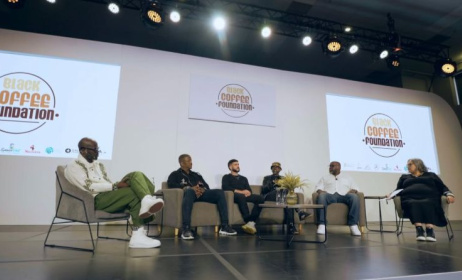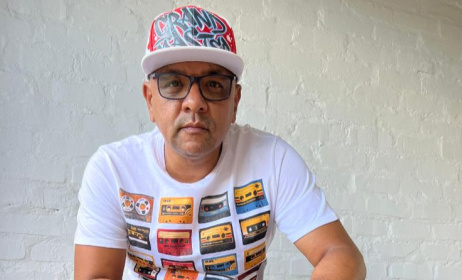Beyele: African mantra for a better tomorrow
The rainstick sets off the dramatic opening in ‘Nto Yomhlaba’, the first song on Afro-soul musician Max-Hoba’s third album Beyele: The Journey Continues. Then the bulging didgeridoo quickly does a low note as the shell horn simultaneously hits a high note. Then primal screams fade in and out. Rapidly. The conga's bass tone and slap follow, but they’re crudely disrupted by the kora. And so the opening goes. It’s a musical explosion of exotic instrumentation, devoid of electronic composition, and immediately expresses the musician’s fury and frustration.
 Max-Hoba.
Max-Hoba.
The frustration stems from corruption, abuse of power and gender-based violence, highlighting past social ills that still prevail today. Beyele is his father’s home village in Ngcobo in the Eastern Cape province of South Africa. Here he draws inspiration from traditional chants such as ‘Nodoli Wam’, a choral type of song that he grew up listening to. But his creative process took a slight departure from his SAMA-winning album Travelling Man (2014).
First conceptualised at The Orbit jazz club in Johannesburg, Beyele: The Journey Continues seeks out a particular sound: a return to African aesthetics punctuated by authentic tunes rooted in southern Africa. Max-Hoba has been back and forth between France and South Africa, working with African musicians, like percussionist Tiale Makhene and kora player Djeli Moussa Diawara who share a common musical vision.
French producer David Felgeirolles, who knew how to seamlessly capture Max-Hoba’s sultry voice, produced the album. This is Max-Hoba's first release on Paradise Sound System. It presents the musician's diverse musical inspirations while maintaining global appeal. It’s a harmonious listening experience that amalgamates languages like Sotho, Xhosa, Swahili and Shona.
‘Ujabulani’ introduces the album's southern African flavours with a guest appearance from the prolific famo accordionist Morusu Hlalele. The song is a play on jabulani, a traditional sorghum beer, and the track is used as a euphemism for people intoxicated with power. Another example of the deep retrospection on this album is ‘Imali Yami’, which features veteran zumba musician Freddie Gwala. It’s one of Gwala’s old tunes that prompted Max-Hoba to seek him out for the collaboration. It serves a heavy dose of nostalgia, taking familiar ears back to the 1960s and mbaqanga.
Nostalgia and melancholy are constant throughout Beyele: The Journey Continues, with weighty messages – wrapped in light and languid musical compositions – and hard-hitting lyrics. All this makes for a sonically beautiful atmosphere, yet dissects the viciousness of the world.
The album is also spiritually engaging, and it provokes an internal journey towards a re-awakening to our existential purpose as human beings. The spiritual alarm clock goes off in songs like ‘Thongo Lam’, which features Buhlebendalo Mda, from the a capella trio The Soil, who delivers velvety vocals that are layered with a deeply stirring drum in the background. The poignant ‘Baba’ also ravels with spiritual significance: slowly starting with voice and intercepted by steady shakers and a unique traditional African drum, which, in Cameroon, was used to call on the gods. But the song’s brilliance comes from the precise selection of minimal instrumentation, arranged just the right way. To avoid losing the quintessential messages of the album, Max-Hoba’s vocals are often deliberately repetitive and monotone, departing from the potential distractions that prevail within popular singing techniques.
‘Lebotha’, which was cowritten by the late Jabulani ‘Hip Hop Pantsula' Tsambo, features moving chants from praise singer Stoan Seate of Bongo Muffin. It’s experimental and funky, with more groove than song. And like most of the music on the album, it belongs to no particular genre, yet evokes many.
On ‘Ndiye Oga’, the music takes a step back, calling on active listening with its captivating Shona lyrics. Next up, ‘Chokwadi’ seeps in, maintaining the slow pace with a soothing sax and rousing piano chords dancing with each other throughout the composition. ‘Thumela’ signals an end to the odyssey. It’s a powerful chant that summons the higher powers back to Earth to correct our tribulations. Much of the songs on the album unfold with unforgiving messages, but the music is merciful – constantly inducing pain while providing the antidote.
Artist: Max-Hoba
Album: Beyele: The Journey Continues
Year: 2020
Label: Paradise Sound System



























Comments
Log in or register to post comments